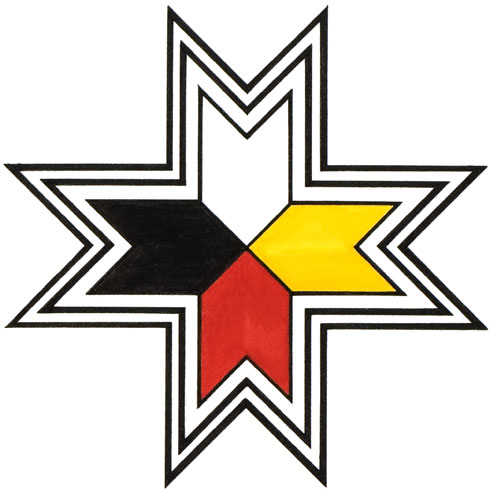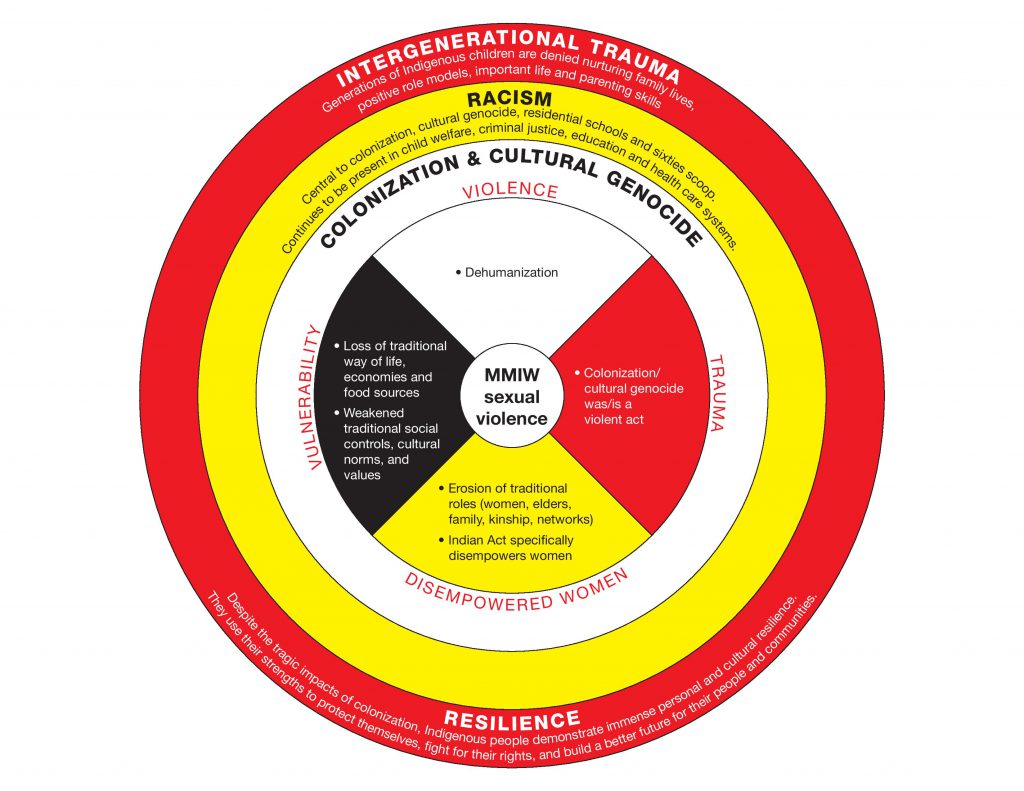Note: We use the term Indigenous to refer to all First Peoples of Turtle Island (North America). The term Indigenous includes both status and non-status people. Since CSAC operates in Mi’kmaki, the traditional unceded lands of the Mi’kmaq, we also acknowledge and recognize the cultural specificities between Indigenous communities.
The Mi’kmaq have been living in Mi’kmaki for thousands of years. Mi’kmaki is made up of Nova Scotia, PEI and large parts of New Brunswick, the Gaspé Peninsula, Newfoundland and into the American state of Maine.

Pre-contact, the Mi’kmaq had our own territories, governance structures, economies, laws and political systems in which women, girls and Two-Spirit people played integral roles in the functioning of society, community and family. Much of the role of women, girls and Two-Spirit people have been erased by history.
Indigenous people in Canada, specifically women, girls and Two-Spirit people face high rates of sexual violence.
Colonialism, cultural genocide, intergenerational trauma, and racism, are some of the root causes that contribute to this lived reality. Sexist and racist ideas about Indigenous women and Two-Spirit people send the message that people won’t notice or react quickly, or at all, if they are subjected to violence or go missing. These attitudes contribute to the crisis of Missing and Murdered Indigenous Women, one of the most brutal forms of sexual violence. Research has found that most cases will never be reported to police or officials.

The Nova Scotia Native Women’s Association has a “Sisterness” approach to family violence and sexualized violence. The mother, sister, auntie approach works best in Mi’kmaq communities where the important first step is letting someone close to you know.
The high rate of sexual violence and abuse of children in residential schools have only been discovered as the children, now elders, found a safe forum to be together and share throughout the Truth and Reconciliation process in Canada. Many only in their dying years were able to tell their stories.
Many mainstream approaches to addressing sexual violence are not culturally relevant or safe for Indigenous people. Instead, Indigenous communities continue to work together to create meaningful and much needed community-based programs. Programs that are based on Indigenous value, cultures and traditions.

(Adapted from source: Break the Silence Nova Scotia)
External Resources:
Mi’kmaw Community Engagement Toolkit [PDF] — A toolkit developed by the Paqtnkek Project is a guide for other communities who want to do similar work as the Paqtnkek Mi’kmaw Nation Responding to and Preventing Sexual Violence Project.
Eskasoni Mental Health Video Series — This video series explores different Indigenous healing methods including smudging, the seven sacred teachings, and other forms of self-care.
“The Seven Sacred Teachings” [YouTube] — A video outlining the seven sacred teachings of many Indigenous nations.
“Mi’kmaq Healing Song” [YouTube] — A version of a traditional Mi’kmaq healing song.
“Kalolin Johnson – Gentle Warrior (featuring Devon Paul and Thunder Herney)” [YouTube] — Gentle Warrior was written by students and staff at Allison Bernard Memorial High School in Eskasoni, Cape Breton, Canada in tribute to Mi’kmaq poet and Eskasoni native, Rita Joe. The track features lead vocals by Kalolin Johnson, the rap styling of Devon Paul and powwow chanting by Thunder Herney. Gentle Warrior was created with the support of the National Arts Centre of Canada.
“How to Smudge: Burning Sage” [YouTube] — How do you smudge? Why do you smudge? Should people be buying/selling traditional medicines like sage? We put these questions to knowledge keeper Debra Courchene.
Community Connections:
Nova Scotia Native Women’s Association
52 Martin Crescent, Truro, NS
Phone: 902-893-7402
The Nova Scotia Native Women’s Association have been offering programs, services and advocacy supports not only to Indigenous women and 2SLGBTQQIA people, but to Indigenous women, girls and 2SLGBTQQIA people across the province both on and off reserve. Primarily working from its main office in Truro they recognize that to truly serve the Indigenous women and 2SLGBTQQIA people, they need a stronger presence across the province and have expanded to offices to Sipekne’katik and Sydney and are currently working on finding office space in the Valley region.
Eskasoni Mental Health Services/Crisis and Referral Center
4555 Shore Road, Eskasoni, NS
Crisis Line: 1-855-379-2099 (Toll-Free)
Main Phone: 902-379-2099
The Esaksoni Crisis and Referral Phone Line is available toll free 24/7 to Mi’kmaq across the province. They also provides online support through the Eskasoni Crisis Worker Facebook account. The line was created in 2009 as a response to a series of suicides and drug related deaths and are services of Eskasoni Mental Health.
Jane Paul Indigenous Resource Centre
TBD, Cape Breton, NS
On June 1, 2020 Karen Bernard was hired as the Director for the Jane Paul Indigenous Women’s Resource Centre and is currently in the process of re-opening the centre with a new outlook of having a few extra staff available to support the clientele that will be accessing the centre. They now have adequate office furniture available for the new staff to work from with opening date approximately around the middle to end of July. They are working to build capacity to move toward prevention and not only sexual violence or human trafficking, by means of supporting initiatives that are brought forward by clients, community or service providers, while creating programming activities for the women and 2SLGBTAAIA people in the community.

